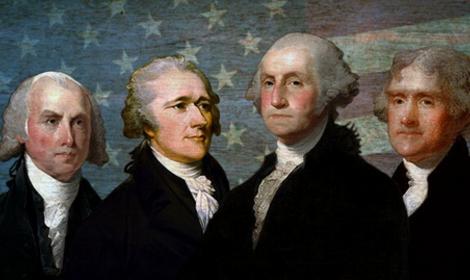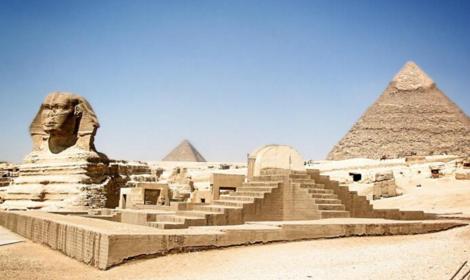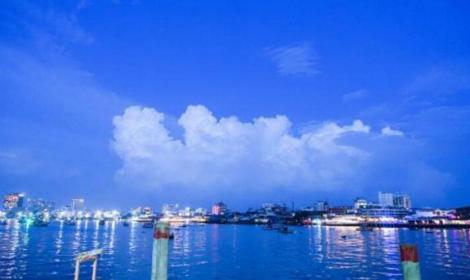为何帝国总会灭亡?那些建立帝国的人知道他们无法永世长存吗?
正文翻译

With so many empires having come and gone throughout history why are they all seemingly doomed to fall at some point? Is it over expansion, financial, declining military, gradual erosion by enemies, or a combination of everything? And did the people that formed and led these empires know that it wouldn’t last forever and that their job while ruling was to make sure the empire didn’t completely fall on their watch?
历史上,有很多帝国兴起消亡,为何它们似乎都注定要在某个时刻灭亡?是过度扩张,财政、军事的衰落,敌人的逐步侵蚀,或者各种因素的综合作用?那些建立和领导帝国的人是否知道他们不会永远持续下去?他们统治时的工作就是确保帝国不会在他们的手中完全灭亡?

With so many empires having come and gone throughout history why are they all seemingly doomed to fall at some point? Is it over expansion, financial, declining military, gradual erosion by enemies, or a combination of everything? And did the people that formed and led these empires know that it wouldn’t last forever and that their job while ruling was to make sure the empire didn’t completely fall on their watch?
历史上,有很多帝国兴起消亡,为何它们似乎都注定要在某个时刻灭亡?是过度扩张,财政、军事的衰落,敌人的逐步侵蚀,或者各种因素的综合作用?那些建立和领导帝国的人是否知道他们不会永远持续下去?他们统治时的工作就是确保帝国不会在他们的手中完全灭亡?
评论翻译
Inmoral_Merchant
The Roman Empire lasted for a cool 1000 years.
It's not that empires fail, it's just that to continue to exist is a hell of a task for any nation.
Nations fall, unxs dissolve and monarchies die out. China breaks, becomes whole again just to fragment again.
For comparison, the United States is only 240 odd years old now. The Soviets didn't even survive a century.
Germany unified a few times in a single century under 4 different governments.
罗马帝国持续了漫长的1000年。
不是帝国失败了,而是对所有国家来说,继续存在都是非常艰巨的任务。
国家灭亡,联盟解散,君主制消亡。中国分裂,再次统一,继续分裂。
相比之下,美国只有240多年的历史。苏联甚至不到一个世纪。
在一个世纪里,德国在4个不同政府下进行了几次统一。
Intranetusa
Another question is what exactly counts as the rise and fall of an empire.
The classical Roman Empire lasted for about ~450 years between the ascension of Augustus in the first century to the supposed "fall" in the mid 400s AD. The Eastern Roman Empire lasted about 1,100 years between Constantine moving to the capital to Constantinople in 330 to its fall in the 1400s. Or the Eastern Roman Empire lasted 1000 years between the formal and permanent administrative division from the Western half after the death of Theodosius in 395 to the fall of Constantinople in the 1400s.
Even though both Eastern and Western halves were Roman, I'm thinking we should count them as separate empires because they eventually had separate governments and separate administrative systems.
另一个问题是,什么才算是一个帝国的兴起和消亡?
从公元一世纪奥古斯都登基到公元400年中期所谓的“灭亡”来算的话,古典罗马帝国持续了大约450年。从330年君士坦丁迁都到君士坦丁堡开始,至15世纪灭亡来算,东罗马帝国持续了大约1100年。或者从395年狄奥多西死后正式、永久的与帝国西半部分分开行政开始,到15世纪君士坦丁堡陷落来算,持续了1000年。
尽管东、西两部分都算是罗马帝国,但我认为我们应该把它们当做独立的帝国,因为它们最终拥有了独立的政府,和独立的行政体系。
Funtycuck
Roman has an Empire before the ascension of Augustus though by the end of the first Punic wars it has its first province and by the end of the 2nd it has an extensive imperial territory. You do not need to have a sole ruler to have an Empire.
I think about whether you count the later Eastern empire depends how you want to measure it. For me its mostly about a continuation of sovereignty and self determination and the Eastern Roman empire is certainly a direct continuation of the Roman state as much as the Western half was its not like the East is an offshoot.
在奥古斯都登基之前,罗马就有帝国了,在第一次布匿战争结束时,罗马有了自己的第一个省,到第二次战争结束时,罗马就有了广阔的帝国领土。不需要拥有唯一的统治者也可以是帝国。
我认为,你要不要算上后来的东帝国,取决于你如何衡量它。在我看来,重点是主权和自主的延续性。东罗马帝国当然是罗马国的直接延续,就像西罗马帝国一样,它不是一个分支。
Jack1715
Before Augustus it was the Roman republic you don’t need a emperor but for example the British empire even though it had a king not a emperor it was still ruled by a monarchy
在奥古斯都之前,它是罗马共和国,你不需要皇帝,就像大英帝国,尽管它是国王而不是皇帝,它仍然是由君主统治的。
ferrel_hadley
Its complex. The UK domestically was basically run between Parliament and the monarch from around the restoration with the monarch taking less and less of a role in government until the late Georgian era where they were more a head of state than a head of government.
The British monarchs were crowned Empror\\\\\\\\Empress of India from after the mutiny.
But an empire does not need a monarch named an Emperor. The French Empire and the British Empire were run by parliamentary governments with universal suffrage for decades after WWI but clearly were empires.
这很复杂。在复辟前后,英国国内基本上是在议会和君主之间运作的,君主在政府中的作用越来越弱,直到乔治王时代晚期,君主更多地是国家元首而不是政府首脑。
英国君主在印度大起义后加冕为印度皇帝/女皇。
但一个帝国并不需要一个被称为皇帝的君主。在第一次世界大战后的几十年里,法兰西帝国和大英帝国一直由普选的议会内阁治理,但很显然,它们是帝国。
Jack1715
I think the British used empire more or less because they wanted to be seen as the succours to the Roman Empire same as the Holy Roman Empire witch was just a alliance of states so not really a empire
我认为英国之所以称为帝国,或多或少是因为他们希望被视为罗马帝国的继任者,像神圣罗马帝国,它只是一个国家联盟,不是一个真正的帝国。
ThePiedPiperOfYou
With so many empires having come and gone throughout history why are they all seemingly doomed to fall at some point?
For the same reason why any rock you see will eventually devolve into sand and rubble. For the same reason our sun will go nova and destroy the entire solar system eventually.
Order requires constant energy input. Entropy always wins in the end.
It is as true in physics as it is true the politics.
“历史上,有很多帝国兴起消亡,为何它们似乎都注定要在某个时刻灭亡”
这和你看到所有岩石最终都会变成沙砾的原因是一样的。和我们的太阳终究会变成新星并摧毁整个太阳系的原因也是一样的。
秩序需要恒定的能量输入。熵最终总是会赢。
物理学和政治都是如此。
pheisenberg
Fundamentally, I think it’s chance, complexity, chaos, whatever you want to call it. Every empire exists in a certain natural and social “ecology”. All the events and twists and turns in the world eventually randomly create an environment the empire can’t survive in. Common specific causes are conquest, environmental disaster, revolution, and provinces breaking away. Wait long enough and eventually one will happen.
Empires often seem to end up victims of their own success. Because they’re so powerful, they have a huge impact on the world, including lots of unintended consequences. Empires tend to both use up all available resources and to cause their neighbors to level up enough to become real threats. I suspect there are also parallels with “disruptive innovation” in platform economics — an empire is a kind of platform, after all. In historical writing I’ve seen it called “advantages of backwardness”. Sometimes it happens that the backward nation has special characteristics that make it much more able to take advantage of a new material or social technology.
从根本上说,我认为是偶然,是复杂,是混乱,随便你想怎么叫它。每个帝国都存在于特定的自然和社会“生态”之中。世界上所有的事件与活动最终都会随机地创造出一个帝国无法继续生存的环境。普遍的具体原因是征服、环境灾难、革命和省份分裂。只要等的时间足够长,最终都会发生上述之一。
各个帝国似乎常常因自己成功而受害。因为他们太过强大,他们对世界产生了巨大的影响,包括许多意想不到的后果。各个帝国往往会耗尽所有可用的资源,并让邻国升级到足以成为真正的威胁。我觉得,这与平台经济中的“颠覆性创新”也有相似之处,毕竟,帝国就是一种平台。在历史著作中,我看到它被称为“后发优势”。有时,落后国家有一些特殊的特性,让它更能利用新的材料或新的社会技术。
goo321
earthquakes, famines, droughts, etc.. occur. Rising and falling governments and groups of humans is inevitable. Change is inevitable.
地震、饥荒、干旱等的发生。人类各种政府和团体的兴起与消亡是不可避免的。变化总是不可避免。
HistoryHobbyist
Well what do you consider the “fall” of an empire to be? It is often a combination of things, including internal struggles and crisis (like famines, droughts, social issues, etc), external threats and invaders, plagues, cultural shifts, conquered lands achieving their own independence, loss of militaristic influence, the loss of a leader who knew how to keep the empire together well, and more.
你认为什么是帝国的“灭亡”?它通常是多种因素的结合,包括内部斗争和危机(如饥荒,干旱,社会问题等),外部威胁和侵略者、瘟疫、文化转移、被征服者取得自己的独立、失去知道如何保持帝国统一的领袖等等。
P_elquelee
What doesn't fall? Even mountains fall some day. Even the universe will fall some day.
An empire can be seen as a society that siphons resources from other places to their core. So it can be said that the core artificially gets more resources than it normally would by the existence of the empire. This is why the fall of an empire is more dramatic than a non-empire society.
有什么不会灭亡?连山都会有塌的一天。甚至宇宙也会有灭亡的一天。
一个帝国可以看作是一个社会,它从其他地方抽取资源到其核心。因此可以说,由于帝国的存在,其核心人为地获得了更多的资源。这就是一个帝国的灭亡比一个非帝国社会的灭亡更为戏剧性的原因。
AelfredRex
An empire is based on the expanding control of trade routes in order to finance the machinery of empire in order to expand trade routes and on and on, so it's a cyclical system at it's core. If something happens to those trade routes, if they are devastated by war, resources run out, changes in the flow or demand of goods, etc. then the empire can no longer pay for itself and collapses under it's own weight.
The Roman Empire couldn't pay for all those civil wars. The Mongol Empire was more about looting than trading. The Ottoman Empire was too slow to modernize. The English Empire didn't survive the economic disruption of WWII. Nor did the French. The Soviet Empire couldn't fund itself without international trade. The US Empire will collapse when the petroleum runs low.
And that will probably be the last empire. China is working on building it's trade routes but more on a partnership model, not a domination one. I think we can safely say the days of empires are long gone.
帝国是基于对贸易路线的控制,这么做是为了给帝国的运转提供资金,而这些资金的目的是不断扩大贸易路线,它是以一个循环系统为核心的。如果这些贸易路线发生状况,比如它们被战争、资源耗尽、货物流动或需求的变化等摧毁,那么帝国就无法再拿出资金,并因自己的重量而崩塌。
罗马帝国因各种内战而无法支付。蒙古帝国更多的是掠夺而不是贸易。奥斯曼帝国过于僵化而无法现代化。大英帝国没能在第二次世界大战的经济混乱中幸存下来,法国也是。苏维埃帝国没有国际贸易,因此无法为自己提供资金。当石油短缺时,美帝国将崩溃。
那可能是最后一个帝国了。中国正在努力打造自己的贸易路线,但更多的是一种合作模式,而不是统治模式。我认为我们可以放心地说,帝国时代已经一去不复返了。
Street-Policy2825
Empires never really fell. The political and military structure fell, yes, but as long as a people have a strong cultural unity they will always come back together. Look at China - because of their cultural unity, they were always able to come back together. So in a way, empires do stand 'forever'. It's the legacy and the culture that remains, not the original political structure.
帝国从未真正灭亡过。是的,政治和军事结构会崩溃,但是只要一个民族有着强大的文化统一,他们就能重新统一起来。看看中国,由于他们的文化统一,他们总是能重新统一。所以在某种程度上,帝国确实是“永远”存在的。留下来的是遗产和文化,而不是原有的政治结构。
KillerSpartan71
A lot of people like to refer to Rome or maybe the Soviets which are great examples. However, how about the collapse of the Bronze age. That is by far, (from my understanding), this was a destruction of the known world, in their eyes at least. I mean you had 50 years of earthquakes, Famine that stretched for hundreds maybe even thousands of miles, Massive revolts and migration from powerful cities at the time due the former, and wave of peoples that were completely alien to the powers at that time known as the 'Sea Peoples'.
Just a massive domino effect honestly that can destroy empires.
很多人喜欢提到罗马或者苏联,它们都是不错的例子。然而,青铜时代的崩溃呢?在当时的人们看来,这是已知世界的毁灭。我的意思是,你经历了50年的地震,饥荒蔓延了数百甚至数千英里,大规模的叛乱,从当时强大的城市移民,还有一波对于当时各个大国完全陌生的"海洋民族"。
这是可以摧毁帝国的、巨大的多米诺骨牌效应。
AgoraiosBum
Two major things - Events and Succession.
For the latter, succession is the path to civil war, and also to taking what is strong and letting it become hollowed out by years of bad leadership that is based on birth rather than merit. From 235-284 AD, the Roman Empire was riven by almost constant civil wars and at one point broke into three completely separate empires before it was finally reunited - but it was never the same after this half-century of conflict, especially in the West.
Events are things like plagues, mass migrations, revolutions, the rise of regional rivals, and technological progress.
Again, to go with Rome, many of its wounds were self-inflicted, but a series of plagues and of mass migrations from Asia also strained the Empire; this combined with some poor succession and weak leaders led to a string of catastrophes.
The Eastern Empire finally fell in part due to developments in gunpowder, as well as Turkic migrations into Anatolia - and was critically weakened when, due to a succession crisis, one of the claimants to the throne invited in the crusaders, who ended up getting into the city by having friends on the inside and then just sacked the place.
有两个主要因素:大事件和继位
先说后者,继位问题容易导致内战,以及夺权行为,让国家被掏空。从公元235年到284年,罗马帝国被持续不断的内战撕裂,一度分裂为三个完全独立的帝国,最后才重新统一,但在持续了半个世纪的冲突之后,罗马帝国再也不是从前了,尤其是在西罗马。
大事件包括瘟疫、大规模迁徙、革命、竞争对手的崛起和技术进步。
罗马的许多创伤都是自己造成的,但一系列的瘟疫、来自亚洲的大规模迁徙也让帝国筋疲力尽,再加上一些糟糕的继任者和软弱的领导人,这一切加在一起导致了一系列的灾难。
东罗马帝国最终分崩离析的原因是火药的发展,以及突厥人向安纳托利亚迁徙,还有因为继业战争而导致帝国严重衰落,当时继位者之一邀请了十字军,他们在城内同伙的帮助下进入了城市,然后洗劫了那个地方。
Champion_of_chair
On your question about whether people knew these empires wouldn't last-
I suspect people have always questioned the status quo- even today there's a lot of speculation today about the ending of an 'American Age' to be replaced by a 'Chinese Age'. I imagine the Romans or the Aztecs knew that everything they built could have been destroyed or eclipsed by another civilisation.
I definitely read some letters from monks writing about how the Fall of Constantinople was heralding the destruction of the Holy Roman Empire and Christendom generally. I reckon there have always been prophesies of impending doom!
关于帝国建立者是否知道他们的帝国能否持续的问题,我觉得他们一直保持怀疑,即使在如今,也有很多人猜测“美国时代”将被“中国时代”取代。我认为罗马人或阿兹特克人知道他们建立的一切都有可能被另一个文明摧毁或超越。
我读过一些僧侣的信,里面说君士坦丁堡的陷落预示着神圣罗马帝国和基督教世界的毁灭。我认为什么时候都有末日将至的预言!
oldmanbringsthebass
Basic system theory. Most "empires" were created by the drive to attain resources: land, mineral, labor. At the start, those flow freely back to the conquering nation. However, in order to maintain stability, increase efficiency, and prevent revolts, the conquering nation needs to install all sort of infrastructure and bureaucratic systems. Those all require energy. As time goes on, the energy/resources required to maintain those systems starts to equal the energy/resourced being extracted and the "empire" reaches a state of diminishing returns, which eventually leads to cutting spending in the conquered countries, which then leads to revolts. Putting down a revolt requires massive amount of energy and resources in the form of military action/garrisons. Eventually it costs more to maintain the "colony'/area of influence than it is worth.
This is particularly true if the economic system of the imperial nation is based primarily on conquest. The empire cannot grow, and then cannot sustain, without conquering more and more nations and extracting more and more resources. In addition to the logistical difficulties inherent in constant expansion, this too always results in a point of diminishing returns.
Eventually the empire either retreats and retrenches or collpases under its own weight.
这是基础的系统理论。大多数“帝国”的建立都是为了获得土地、矿产、劳动力等资源。最开始,这些资源能顺畅的返回征服国。然而,为了维持稳定、提高效率和防止叛乱,征服国需要建立各种基础设施和官僚制度。而这些都需要精力。随着时间的推移,维持这些制度所需要投入的精力、资源开始等于获得的资源,“帝国”处于收益递减的状态,于是需要削减被征服国的开支,进而导致叛乱。要镇压叛乱,需要在军事行动和驻守部队方面投入大量的精力和资源。最终,维持殖民地的成本超过了收益。
如果这个帝国的经济体系是建立在征服之上的,那么上面所说的尤其正确。如果不征服越来越多的国家,获得越来越多的资源,帝国就无法发展,然后无法维持。不断扩张除了固有的后勤困难之外,它也总是导致收益递减。
最终,帝国要么撤退、收缩,要么在自身的重压下崩溃。
Sean951
Given enough time, everything ends. Massive cities are abandoned or razed, populations move in response to famines and droughts, and local power structures either change or collapse or both. You can successfully weather that change for a thousand years, but the one time you fail can be the end.
只要时间够长,万事万物都会终结。大城市被遗弃或摧毁,人口因饥荒和干旱而迁移,地方权力结构要么改变要么崩溃。你可以成功地经受住这种变化一千年,但你失败的那一次可能就是终结。
DeaththeEternal
If you want the most general, sweeping element it's because an empire is a system of exploitation based on one group having an advantage based on superior use of force relative to the groups it exploits. These advantages never last forever and their decay/change is where and how the process of an empire falling tends to manifest in real time.
The nature of that exploitation and that advantage vary heavily and there's no one size fits all element here.
And some systems fit into the local geography and culture well enough that they never truly die. See: China.
如果你想要最普遍的、最全面的要素,那么答案是:帝国是一个剥削体系,剥削阶级因为拥有武力优势,一直在压榨被剥削阶级。这种优势永远不会持续,它们的衰落、变化是一个帝国衰落过程的真实表现。
这种剥削和这种优势的性质千差万别,无法一言概括。
有些制度完美地融入了当地的地理和文化,让它们永远不会消亡,比如中国。
jh-creative
Entropy.
You can only grow so big before you start to fail. The size of the empires growth is limited by technology and food.
Stretching to far out is the reason most empires collapsed. Unless you have fiercely loyal rulers for the outer reaches of your empire, the further you go from your central seat of power the weaker your empire, control, and laws become.
If you spend too much effort and resources reinforcing the outskirts of your empire then you will fall from internal disputes, as people starve and the rich become poor as your empire funnels money outwards.
You could argue then, that a smaller empire would last longer. True, that's probably the case. But then you risk being swallowed by larger empire. In today's age, the general rule of law and order has created a tenuous peace between nations. World order is always always on the cusp of absolute failure.
This is the longest stretch of time the world has ever gone withouta "global" conflict.
因为熵。
在你开始灭亡之前,你只能发展到一定规模。由于技术和粮食的限制,帝国的发展规模是有数的。
扩张得太远是大多数帝国崩溃的原因。除非你在帝国外部地区拥有非常忠诚的统治者,否则离权力中心越远,你的帝国、控制力和法律执行力就越弱。
如果你花费太多精力和资源去加强帝国的外围,那么你会亡于内部冲突,因为帝国的资金外流导致富人变穷,人民挨饿。
你可能会说一个较小的帝国可以延续更长时间。没错,可能会这样。但你有被大帝国吞并的风险。在当今时代,普遍的法治和秩序让各国之间形成了脆弱的和平。世界秩序一直处于失败的边缘。
这是世界上有史以来未有“全球性冲突”的最长的一段时间。
The Roman Empire lasted for a cool 1000 years.
It's not that empires fail, it's just that to continue to exist is a hell of a task for any nation.
Nations fall, unxs dissolve and monarchies die out. China breaks, becomes whole again just to fragment again.
For comparison, the United States is only 240 odd years old now. The Soviets didn't even survive a century.
Germany unified a few times in a single century under 4 different governments.
罗马帝国持续了漫长的1000年。
不是帝国失败了,而是对所有国家来说,继续存在都是非常艰巨的任务。
国家灭亡,联盟解散,君主制消亡。中国分裂,再次统一,继续分裂。
相比之下,美国只有240多年的历史。苏联甚至不到一个世纪。
在一个世纪里,德国在4个不同政府下进行了几次统一。
Intranetusa
Another question is what exactly counts as the rise and fall of an empire.
The classical Roman Empire lasted for about ~450 years between the ascension of Augustus in the first century to the supposed "fall" in the mid 400s AD. The Eastern Roman Empire lasted about 1,100 years between Constantine moving to the capital to Constantinople in 330 to its fall in the 1400s. Or the Eastern Roman Empire lasted 1000 years between the formal and permanent administrative division from the Western half after the death of Theodosius in 395 to the fall of Constantinople in the 1400s.
Even though both Eastern and Western halves were Roman, I'm thinking we should count them as separate empires because they eventually had separate governments and separate administrative systems.
另一个问题是,什么才算是一个帝国的兴起和消亡?
从公元一世纪奥古斯都登基到公元400年中期所谓的“灭亡”来算的话,古典罗马帝国持续了大约450年。从330年君士坦丁迁都到君士坦丁堡开始,至15世纪灭亡来算,东罗马帝国持续了大约1100年。或者从395年狄奥多西死后正式、永久的与帝国西半部分分开行政开始,到15世纪君士坦丁堡陷落来算,持续了1000年。
尽管东、西两部分都算是罗马帝国,但我认为我们应该把它们当做独立的帝国,因为它们最终拥有了独立的政府,和独立的行政体系。
Funtycuck
Roman has an Empire before the ascension of Augustus though by the end of the first Punic wars it has its first province and by the end of the 2nd it has an extensive imperial territory. You do not need to have a sole ruler to have an Empire.
I think about whether you count the later Eastern empire depends how you want to measure it. For me its mostly about a continuation of sovereignty and self determination and the Eastern Roman empire is certainly a direct continuation of the Roman state as much as the Western half was its not like the East is an offshoot.
在奥古斯都登基之前,罗马就有帝国了,在第一次布匿战争结束时,罗马有了自己的第一个省,到第二次战争结束时,罗马就有了广阔的帝国领土。不需要拥有唯一的统治者也可以是帝国。
我认为,你要不要算上后来的东帝国,取决于你如何衡量它。在我看来,重点是主权和自主的延续性。东罗马帝国当然是罗马国的直接延续,就像西罗马帝国一样,它不是一个分支。
Jack1715
Before Augustus it was the Roman republic you don’t need a emperor but for example the British empire even though it had a king not a emperor it was still ruled by a monarchy
在奥古斯都之前,它是罗马共和国,你不需要皇帝,就像大英帝国,尽管它是国王而不是皇帝,它仍然是由君主统治的。
ferrel_hadley
Its complex. The UK domestically was basically run between Parliament and the monarch from around the restoration with the monarch taking less and less of a role in government until the late Georgian era where they were more a head of state than a head of government.
The British monarchs were crowned Empror\\\\\\\\Empress of India from after the mutiny.
But an empire does not need a monarch named an Emperor. The French Empire and the British Empire were run by parliamentary governments with universal suffrage for decades after WWI but clearly were empires.
这很复杂。在复辟前后,英国国内基本上是在议会和君主之间运作的,君主在政府中的作用越来越弱,直到乔治王时代晚期,君主更多地是国家元首而不是政府首脑。
英国君主在印度大起义后加冕为印度皇帝/女皇。
但一个帝国并不需要一个被称为皇帝的君主。在第一次世界大战后的几十年里,法兰西帝国和大英帝国一直由普选的议会内阁治理,但很显然,它们是帝国。
Jack1715
I think the British used empire more or less because they wanted to be seen as the succours to the Roman Empire same as the Holy Roman Empire witch was just a alliance of states so not really a empire
我认为英国之所以称为帝国,或多或少是因为他们希望被视为罗马帝国的继任者,像神圣罗马帝国,它只是一个国家联盟,不是一个真正的帝国。
ThePiedPiperOfYou
With so many empires having come and gone throughout history why are they all seemingly doomed to fall at some point?
For the same reason why any rock you see will eventually devolve into sand and rubble. For the same reason our sun will go nova and destroy the entire solar system eventually.
Order requires constant energy input. Entropy always wins in the end.
It is as true in physics as it is true the politics.
“历史上,有很多帝国兴起消亡,为何它们似乎都注定要在某个时刻灭亡”
这和你看到所有岩石最终都会变成沙砾的原因是一样的。和我们的太阳终究会变成新星并摧毁整个太阳系的原因也是一样的。
秩序需要恒定的能量输入。熵最终总是会赢。
物理学和政治都是如此。
pheisenberg
Fundamentally, I think it’s chance, complexity, chaos, whatever you want to call it. Every empire exists in a certain natural and social “ecology”. All the events and twists and turns in the world eventually randomly create an environment the empire can’t survive in. Common specific causes are conquest, environmental disaster, revolution, and provinces breaking away. Wait long enough and eventually one will happen.
Empires often seem to end up victims of their own success. Because they’re so powerful, they have a huge impact on the world, including lots of unintended consequences. Empires tend to both use up all available resources and to cause their neighbors to level up enough to become real threats. I suspect there are also parallels with “disruptive innovation” in platform economics — an empire is a kind of platform, after all. In historical writing I’ve seen it called “advantages of backwardness”. Sometimes it happens that the backward nation has special characteristics that make it much more able to take advantage of a new material or social technology.
从根本上说,我认为是偶然,是复杂,是混乱,随便你想怎么叫它。每个帝国都存在于特定的自然和社会“生态”之中。世界上所有的事件与活动最终都会随机地创造出一个帝国无法继续生存的环境。普遍的具体原因是征服、环境灾难、革命和省份分裂。只要等的时间足够长,最终都会发生上述之一。
各个帝国似乎常常因自己成功而受害。因为他们太过强大,他们对世界产生了巨大的影响,包括许多意想不到的后果。各个帝国往往会耗尽所有可用的资源,并让邻国升级到足以成为真正的威胁。我觉得,这与平台经济中的“颠覆性创新”也有相似之处,毕竟,帝国就是一种平台。在历史著作中,我看到它被称为“后发优势”。有时,落后国家有一些特殊的特性,让它更能利用新的材料或新的社会技术。
goo321
earthquakes, famines, droughts, etc.. occur. Rising and falling governments and groups of humans is inevitable. Change is inevitable.
地震、饥荒、干旱等的发生。人类各种政府和团体的兴起与消亡是不可避免的。变化总是不可避免。
HistoryHobbyist
Well what do you consider the “fall” of an empire to be? It is often a combination of things, including internal struggles and crisis (like famines, droughts, social issues, etc), external threats and invaders, plagues, cultural shifts, conquered lands achieving their own independence, loss of militaristic influence, the loss of a leader who knew how to keep the empire together well, and more.
你认为什么是帝国的“灭亡”?它通常是多种因素的结合,包括内部斗争和危机(如饥荒,干旱,社会问题等),外部威胁和侵略者、瘟疫、文化转移、被征服者取得自己的独立、失去知道如何保持帝国统一的领袖等等。
P_elquelee
What doesn't fall? Even mountains fall some day. Even the universe will fall some day.
An empire can be seen as a society that siphons resources from other places to their core. So it can be said that the core artificially gets more resources than it normally would by the existence of the empire. This is why the fall of an empire is more dramatic than a non-empire society.
有什么不会灭亡?连山都会有塌的一天。甚至宇宙也会有灭亡的一天。
一个帝国可以看作是一个社会,它从其他地方抽取资源到其核心。因此可以说,由于帝国的存在,其核心人为地获得了更多的资源。这就是一个帝国的灭亡比一个非帝国社会的灭亡更为戏剧性的原因。
AelfredRex
An empire is based on the expanding control of trade routes in order to finance the machinery of empire in order to expand trade routes and on and on, so it's a cyclical system at it's core. If something happens to those trade routes, if they are devastated by war, resources run out, changes in the flow or demand of goods, etc. then the empire can no longer pay for itself and collapses under it's own weight.
The Roman Empire couldn't pay for all those civil wars. The Mongol Empire was more about looting than trading. The Ottoman Empire was too slow to modernize. The English Empire didn't survive the economic disruption of WWII. Nor did the French. The Soviet Empire couldn't fund itself without international trade. The US Empire will collapse when the petroleum runs low.
And that will probably be the last empire. China is working on building it's trade routes but more on a partnership model, not a domination one. I think we can safely say the days of empires are long gone.
帝国是基于对贸易路线的控制,这么做是为了给帝国的运转提供资金,而这些资金的目的是不断扩大贸易路线,它是以一个循环系统为核心的。如果这些贸易路线发生状况,比如它们被战争、资源耗尽、货物流动或需求的变化等摧毁,那么帝国就无法再拿出资金,并因自己的重量而崩塌。
罗马帝国因各种内战而无法支付。蒙古帝国更多的是掠夺而不是贸易。奥斯曼帝国过于僵化而无法现代化。大英帝国没能在第二次世界大战的经济混乱中幸存下来,法国也是。苏维埃帝国没有国际贸易,因此无法为自己提供资金。当石油短缺时,美帝国将崩溃。
那可能是最后一个帝国了。中国正在努力打造自己的贸易路线,但更多的是一种合作模式,而不是统治模式。我认为我们可以放心地说,帝国时代已经一去不复返了。
Street-Policy2825
Empires never really fell. The political and military structure fell, yes, but as long as a people have a strong cultural unity they will always come back together. Look at China - because of their cultural unity, they were always able to come back together. So in a way, empires do stand 'forever'. It's the legacy and the culture that remains, not the original political structure.
帝国从未真正灭亡过。是的,政治和军事结构会崩溃,但是只要一个民族有着强大的文化统一,他们就能重新统一起来。看看中国,由于他们的文化统一,他们总是能重新统一。所以在某种程度上,帝国确实是“永远”存在的。留下来的是遗产和文化,而不是原有的政治结构。
KillerSpartan71
A lot of people like to refer to Rome or maybe the Soviets which are great examples. However, how about the collapse of the Bronze age. That is by far, (from my understanding), this was a destruction of the known world, in their eyes at least. I mean you had 50 years of earthquakes, Famine that stretched for hundreds maybe even thousands of miles, Massive revolts and migration from powerful cities at the time due the former, and wave of peoples that were completely alien to the powers at that time known as the 'Sea Peoples'.
Just a massive domino effect honestly that can destroy empires.
很多人喜欢提到罗马或者苏联,它们都是不错的例子。然而,青铜时代的崩溃呢?在当时的人们看来,这是已知世界的毁灭。我的意思是,你经历了50年的地震,饥荒蔓延了数百甚至数千英里,大规模的叛乱,从当时强大的城市移民,还有一波对于当时各个大国完全陌生的"海洋民族"。
这是可以摧毁帝国的、巨大的多米诺骨牌效应。
AgoraiosBum
Two major things - Events and Succession.
For the latter, succession is the path to civil war, and also to taking what is strong and letting it become hollowed out by years of bad leadership that is based on birth rather than merit. From 235-284 AD, the Roman Empire was riven by almost constant civil wars and at one point broke into three completely separate empires before it was finally reunited - but it was never the same after this half-century of conflict, especially in the West.
Events are things like plagues, mass migrations, revolutions, the rise of regional rivals, and technological progress.
Again, to go with Rome, many of its wounds were self-inflicted, but a series of plagues and of mass migrations from Asia also strained the Empire; this combined with some poor succession and weak leaders led to a string of catastrophes.
The Eastern Empire finally fell in part due to developments in gunpowder, as well as Turkic migrations into Anatolia - and was critically weakened when, due to a succession crisis, one of the claimants to the throne invited in the crusaders, who ended up getting into the city by having friends on the inside and then just sacked the place.
有两个主要因素:大事件和继位
先说后者,继位问题容易导致内战,以及夺权行为,让国家被掏空。从公元235年到284年,罗马帝国被持续不断的内战撕裂,一度分裂为三个完全独立的帝国,最后才重新统一,但在持续了半个世纪的冲突之后,罗马帝国再也不是从前了,尤其是在西罗马。
大事件包括瘟疫、大规模迁徙、革命、竞争对手的崛起和技术进步。
罗马的许多创伤都是自己造成的,但一系列的瘟疫、来自亚洲的大规模迁徙也让帝国筋疲力尽,再加上一些糟糕的继任者和软弱的领导人,这一切加在一起导致了一系列的灾难。
东罗马帝国最终分崩离析的原因是火药的发展,以及突厥人向安纳托利亚迁徙,还有因为继业战争而导致帝国严重衰落,当时继位者之一邀请了十字军,他们在城内同伙的帮助下进入了城市,然后洗劫了那个地方。
Champion_of_chair
On your question about whether people knew these empires wouldn't last-
I suspect people have always questioned the status quo- even today there's a lot of speculation today about the ending of an 'American Age' to be replaced by a 'Chinese Age'. I imagine the Romans or the Aztecs knew that everything they built could have been destroyed or eclipsed by another civilisation.
I definitely read some letters from monks writing about how the Fall of Constantinople was heralding the destruction of the Holy Roman Empire and Christendom generally. I reckon there have always been prophesies of impending doom!
关于帝国建立者是否知道他们的帝国能否持续的问题,我觉得他们一直保持怀疑,即使在如今,也有很多人猜测“美国时代”将被“中国时代”取代。我认为罗马人或阿兹特克人知道他们建立的一切都有可能被另一个文明摧毁或超越。
我读过一些僧侣的信,里面说君士坦丁堡的陷落预示着神圣罗马帝国和基督教世界的毁灭。我认为什么时候都有末日将至的预言!
oldmanbringsthebass
Basic system theory. Most "empires" were created by the drive to attain resources: land, mineral, labor. At the start, those flow freely back to the conquering nation. However, in order to maintain stability, increase efficiency, and prevent revolts, the conquering nation needs to install all sort of infrastructure and bureaucratic systems. Those all require energy. As time goes on, the energy/resources required to maintain those systems starts to equal the energy/resourced being extracted and the "empire" reaches a state of diminishing returns, which eventually leads to cutting spending in the conquered countries, which then leads to revolts. Putting down a revolt requires massive amount of energy and resources in the form of military action/garrisons. Eventually it costs more to maintain the "colony'/area of influence than it is worth.
This is particularly true if the economic system of the imperial nation is based primarily on conquest. The empire cannot grow, and then cannot sustain, without conquering more and more nations and extracting more and more resources. In addition to the logistical difficulties inherent in constant expansion, this too always results in a point of diminishing returns.
Eventually the empire either retreats and retrenches or collpases under its own weight.
这是基础的系统理论。大多数“帝国”的建立都是为了获得土地、矿产、劳动力等资源。最开始,这些资源能顺畅的返回征服国。然而,为了维持稳定、提高效率和防止叛乱,征服国需要建立各种基础设施和官僚制度。而这些都需要精力。随着时间的推移,维持这些制度所需要投入的精力、资源开始等于获得的资源,“帝国”处于收益递减的状态,于是需要削减被征服国的开支,进而导致叛乱。要镇压叛乱,需要在军事行动和驻守部队方面投入大量的精力和资源。最终,维持殖民地的成本超过了收益。
如果这个帝国的经济体系是建立在征服之上的,那么上面所说的尤其正确。如果不征服越来越多的国家,获得越来越多的资源,帝国就无法发展,然后无法维持。不断扩张除了固有的后勤困难之外,它也总是导致收益递减。
最终,帝国要么撤退、收缩,要么在自身的重压下崩溃。
Sean951
Given enough time, everything ends. Massive cities are abandoned or razed, populations move in response to famines and droughts, and local power structures either change or collapse or both. You can successfully weather that change for a thousand years, but the one time you fail can be the end.
只要时间够长,万事万物都会终结。大城市被遗弃或摧毁,人口因饥荒和干旱而迁移,地方权力结构要么改变要么崩溃。你可以成功地经受住这种变化一千年,但你失败的那一次可能就是终结。
DeaththeEternal
If you want the most general, sweeping element it's because an empire is a system of exploitation based on one group having an advantage based on superior use of force relative to the groups it exploits. These advantages never last forever and their decay/change is where and how the process of an empire falling tends to manifest in real time.
The nature of that exploitation and that advantage vary heavily and there's no one size fits all element here.
And some systems fit into the local geography and culture well enough that they never truly die. See: China.
如果你想要最普遍的、最全面的要素,那么答案是:帝国是一个剥削体系,剥削阶级因为拥有武力优势,一直在压榨被剥削阶级。这种优势永远不会持续,它们的衰落、变化是一个帝国衰落过程的真实表现。
这种剥削和这种优势的性质千差万别,无法一言概括。
有些制度完美地融入了当地的地理和文化,让它们永远不会消亡,比如中国。
jh-creative
Entropy.
You can only grow so big before you start to fail. The size of the empires growth is limited by technology and food.
Stretching to far out is the reason most empires collapsed. Unless you have fiercely loyal rulers for the outer reaches of your empire, the further you go from your central seat of power the weaker your empire, control, and laws become.
If you spend too much effort and resources reinforcing the outskirts of your empire then you will fall from internal disputes, as people starve and the rich become poor as your empire funnels money outwards.
You could argue then, that a smaller empire would last longer. True, that's probably the case. But then you risk being swallowed by larger empire. In today's age, the general rule of law and order has created a tenuous peace between nations. World order is always always on the cusp of absolute failure.
This is the longest stretch of time the world has ever gone withouta "global" conflict.
因为熵。
在你开始灭亡之前,你只能发展到一定规模。由于技术和粮食的限制,帝国的发展规模是有数的。
扩张得太远是大多数帝国崩溃的原因。除非你在帝国外部地区拥有非常忠诚的统治者,否则离权力中心越远,你的帝国、控制力和法律执行力就越弱。
如果你花费太多精力和资源去加强帝国的外围,那么你会亡于内部冲突,因为帝国的资金外流导致富人变穷,人民挨饿。
你可能会说一个较小的帝国可以延续更长时间。没错,可能会这样。但你有被大帝国吞并的风险。在当今时代,普遍的法治和秩序让各国之间形成了脆弱的和平。世界秩序一直处于失败的边缘。
这是世界上有史以来未有“全球性冲突”的最长的一段时间。











